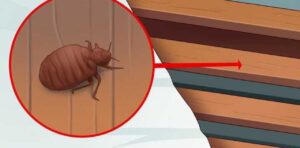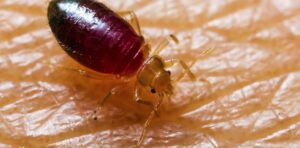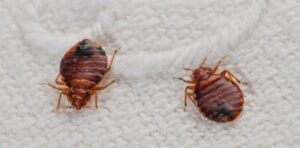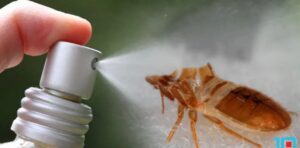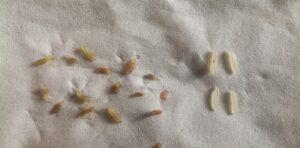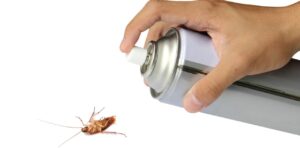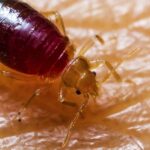Bed bugs, those pesky little creatures that invade our living spaces, possess a peculiar and distinctive characteristic. When you squish them or apply pesticides, they emit a noticeable odor. But why do bed bugs smell when you kill them? In this article, we will uncover the science behind this unique phenomenon and explore the factors contributing to this intriguing odor.
Have you ever wondered why those tiny bed bugs release a peculiar odor when they meet their demise? This enigmatic scent has puzzled many, and in this article, we will delve into the fascinating world of bed bug biology to uncover the secrets behind Why Do Bed Bugs Smell When You Kill Them? Prepare to be amazed by the intricate web of chemical reactions and defense mechanisms that make these pests truly remarkable.
To shed light on the mystery of bed bug odor, we will explore the chemical makeup of these pests, the role of alarm pheromones, and the influence of factors such as age, diet, and environmental conditions. By the end of this journey, you’ll not only know why bed bugs emit that distinctive smell, but you’ll also gain valuab
Understanding Bed Bugs
Bed bugs, scientifically known as Cimex lectularius, are small, flat, oval-shaped insects that primarily feed on the blood of humans and warm-blooded animals. These nocturnal pests are notoriously difficult to detect and can infest a variety of places, with a particular preference for bedding and furniture. Understanding their biology and habits is crucial in deciphering the reason behind the odor they release when killed.
Biology of Bed Bugs
Bed bugs go through several life stages, including eggs, nymphs, and adults. They rely on blood meals for nourishment, and their bites can cause itching and skin reactions in humans. Their flat bodies enable them to hide in tiny cracks and crevices, making it challenging to exterminate them effectively.
Behavior of Bed Bugs
Bed bugs are primarily active at night, seeking out their hosts while they sleep. They are skilled at finding hiding places and can go without feeding for extended periods, which contributes to their resilience and the difficulty of eradicating them. Their secretive nature makes it challenging to discover an infestation until it becomes severe.
The Unpleasant Odor
One of the most unsettling aspects of dealing with bed bugs is the odor they emit when they are killed. This odor has been described as sweet and musty, often likened to the smell of raspberries or coriander. The question is, why do these tiny insects produce such an unpleasant scent, and what purpose does it serve?
Chemical Composition
The odor produced by bed bugs is a complex mixture of compounds, primarily consisting of pheromones and alarm chemicals. These compounds include histamine, 2-methyl-1-butanol, and 2,5-dimethylpyrazine, among others. The specific blend of these chemicals is what gives the odor its distinctive, offensive character.
Reasons for the Odor
Several theories have been proposed to explain why bed bugs emit this odor when threatened or killed. Some researchers believe it is a defense mechanism, deterring predators or potential threats. Others suggest that it may serve as a form of chemical communication within the bed bug colony. Understanding the reasons behind this odor can shed light on the bed bug’s behavior and biology.
Detecting Bed Bugs through Odor

The foul odor released by bed bugs when they are killed may be unpleasant, but it can also be used as a tool for detection. Pest control professionals and researchers have found ways to harness this odor for monitoring and identifying infestations.
| Method of Detection | Description | Key Benefits |
| Human Sensitivity | Some individuals are highly sensitive to bed bug odor, allowing them to detect infestations early. | Early detection can lead to prompt intervention and pest control. |
| K-9 Bed Bug Inspections | Specially trained dogs can detect bed bug odor with remarkable accuracy. | Highly effective for identifying infestations, particularly in large spaces. |
| Chemical Detectors | Scientifically developed devices can identify the presence of bed bug odor. | Offers objective and reliable detection, reducing the risk of false positives. |
| Visual Inspection | Careful scrutiny of potential hiding spots for live or dead bed bugs and their feces. | Provides direct evidence of infestation when bed bugs are observed. |
| Residual Odor Tests | Testing for the presence of residual odors even after bed bugs have been removed. | Helps confirm the success of pest control efforts. |
| Combining Methods | Utilizing a combination of human sensitivity, K-9 inspections, and chemical detectors for comprehensive detection. | Maximizes accuracy and ensures thorough inspection coverage. |
Utilizing Scent Detection Dogs
Scent detection dogs, often referred to as “bed bug dogs,” are trained to identify the specific odor of bed bugs. These highly skilled canines can locate infestations with remarkable accuracy. The dogs are a valuable asset in pest control efforts, as they can pinpoint the presence of bed bugs, even in hard-to-reach areas.
Bed Bug Traps and Monitors
In recent years, there has been a surge in the development of bed bug traps and monitors that leverage the insects’ odor. These devices use attractants to lure bed bugs into a trap, where they can be captured and removed. Understanding the chemical composition of the odor has been instrumental in designing effective traps.
The Future of Bed Bug Control
As researchers continue to study the biology and behavior of bed bugs, our understanding of their odor and its role in their survival may lead to innovative control methods. Whether it’s through the development of more efficient traps, improved detection techniques, or a deeper insight into their biology, the quest to eliminate bed bug infestations remains ongoing.
Why Do Bed Bugs Smell?
Bed bugs release a characteristic odor when threatened or killed. This smell, described as musty, sweet, or even reminiscent of coriander, can be unpleasant and concerning. Several factors contribute to the production of this odor.
In the enchanting and vibrant culture of Jamaica, even the most mundane things can take on unique and colorful names. Bed bugs, those pesky little insects that invade our sleeping spaces, are no exception. When we refer to What Do Jamaicans Call Bed Bugs? we are addressing the colloquial term used in Jamaica to describe bed bugs.
Alarm Pheromones
Bed bugs release alarm pheromones as a defense mechanism. When they sense danger or are physically disturbed, they secrete these chemical signals to communicate with other bed bugs. This signaling mechanism is a survival tactic that warns nearby bed bugs of potential danger.
Chemical Reactions
The act of killing or squishing bed bugs can trigger chemical reactions within their bodies, resulting in the release of volatile compounds. These compounds can combine and produce the characteristic odor we associate with bed bugs.
The Role of Microbes
The microbial environment in and on bed bugs may also play a role in the production of odors. Understanding how microorganisms interact with bed bugs can shed light on the source of the smell.
The Science Behind Bed Bug Odor

To delve deeper into the science of bed bug odor, we need to explore the chemical compounds and reactions that occur within these insects.
Chemical Composition
Bed bug odor is a complex mixture of various chemical compounds. By analyzing the composition of these compounds, scientists have gained insights into why bed bugs emit a distinct smell.
Chemical Reactions
When bed bugs are killed, their bodies undergo chemical reactions. These reactions can release volatile organic compounds (VOCs) responsible for the characteristic odor. Understanding the specific reactions involved is crucial to decoding the mystery of bed bug smell.
The Coriander Connection
Many people describe the smell of crushed bed bugs as similar to coriander. Exploring the chemical makeup of coriander and its potential connection to bed bug odor provides valuable insights.
Factors Influencing Bed Bug Odor
The intensity and characteristics of bed bug odor can vary depending on several factors.
Age and Gender
The age and gender of bed bugs can influence the strength and type of odor they emit. Understanding these variations is vital to interpreting the odor’s source.
Diet and Feeding Frequency
What bed bugs feed on and how often they feed can affect the chemicals present in their bodies. These dietary factors have implications for the odor they produce.
Environmental Conditions
The environmental conditions in which bed bugs live also play a role in their odor. Factors such as temperature and humidity can impact the smell they emit.
Detecting Bed Bug Odor
Knowing how to detect bed bug odor is essential for early infestation detection and effective pest control.
Human Sensitivity
While some people are highly sensitive to bed bug odor, others may not notice it. Understanding individual differences in odor detection is critical for timely intervention.
K-9 Bed Bug Inspections
The use of specially trained dogs to detect bed bug odor has become a popular method for identifying infestations. We’ll explore the effectiveness of this approach and the science behind it.
Chemical Detectors
Scientists and pest control professionals have developed chemical detectors to identify bed bug odor. These tools are crucial for accurate and rapid infestation assessment.
Health and Environmental Implications
The presence of bed bug odor may have health and environmental implications worth considering.
Health Effects
Breathing in the compounds responsible for bed bug odor may have health consequences. We’ll discuss the potential risks associated with prolonged exposure to these chemicals.
Environmental Impact
The use of pesticides to control bed bugs may contribute to the release of odor. Examining the environmental consequences of pesticide use is vital for sustainable pest management.
Management and Control
Effectively managing bed bug infestations requires an understanding of how odor relates to control strategies.
Integrated Pest Management
Integrated pest management (IPM) is an approach that combines various methods to control bed bugs. We’ll explore how odor detection can be integrated into IPM strategies.
Chemical Treatments
The use of chemical treatments is a common approach for bed bug control. We’ll discuss how these treatments may impact the release of odor and their effectiveness in eradication.
Preventive Measures
Preventing bed bug infestations is often the best strategy. We’ll provide insights into the steps you can take to minimize the risk of encountering these pests.
Alternative Approaches
In addition to chemical treatments, there are alternative methods for managing bed bug infestations. These methods may offer solutions that minimize the release of odor.
Conclusion
Why do bed bugs emit that peculiar odor when you squish them or apply pesticides? We’ve unraveled the mystery behind “Why Do Bed Bugs Smell When You Kill Them?” By exploring their biology and the chemical reactions triggered by their demise, we’ve unveiled the source of this unique scent.
This newfound understanding not only satisfies our curiosity but also has practical implications for effective pest control strategies. Armed with this knowledge, you can better address these unwelcome guests, knowing why bed bugs smell when you kill them and how to deal with the issue.


